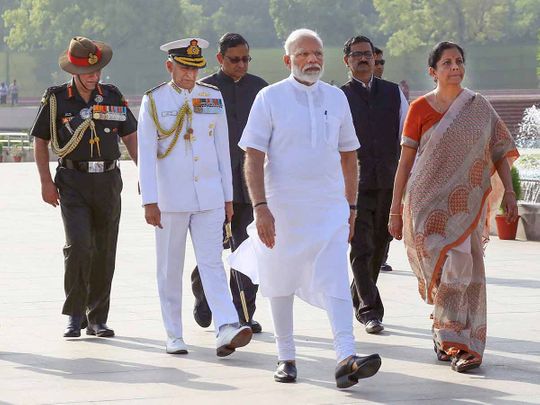
NEW DELHI: Narendra Modi, who crushed doubts about his place as one of India's most dominant leaders in recent history by winning another landslide victory this month, will be sworn in for his second term as prime minister on Thursday, in a ceremony attended by as many as 8,000 guests.
Security remained tight around the massive presidential mansion, as national leaders and other dignitaries began arriving in New Delhi early Thursday. In a clear sign of the magnitude of Modi's victory - his Bharatiya Janata Party was the first in more than three decades to win a clear majority in consecutive elections - officials say that his swearing-in will be the largest event ever held on the mansion's 300-acre grounds.
"The president will administer the oath of office and secrecy to the prime minister and other members of the union council of ministers at 7 p.m.," the office of India's largely ceremonial president, Ram Nath Kovind, said in a statement.
The evening ceremony was likely to strike a balance between the ascent of Modi's party as the country's dominant political force, and Modi's ambitions of projecting India as a global power, particularly in a region where China has made deep inroads.
The list of leaders expected to attend the ceremony indicated that Modi would continue to focus on "neighbors first": It included leaders from Bhutan, Mauritius, Myanmar, Nepal and Sri Lanka.
On his first foreign trip abroad, Modi is expected to visit another neighbor, the Maldives. As in other countries, India faces strong competition there from China, which is using infrastructure investment to spread its influence around the globe.
But in a sign that the blowback of what was an intense election could cast a shadow over Modi's second term, Mamata Banerjee, the chief minister of the Indian state of West Bengal, refused to attend the swearing-in ceremony in protest over what she saw as a provocative move by Modi.
He has invited to the ceremony family members of dozens of workers from his party, known as the BJP, who the party says were killed in West Bengal, indirectly pointing fingers at Banerjee's governing party, the All-India Trinamool Congress.
West Bengal was the scene of some of the worst election violence in what was otherwise a relatively peaceful and orderly vote, with more than 600 million people casting votes across the country in a process that lasted six weeks. Street clashes erupted between supporters of the BJP and the Trinamool Congress, but Banerjee denied that they led to the deaths of any BJP supporters.
"There have been no political murders in Bengal," Banerjee said about the BJP's claims. "So, I am sorry, Narendra Modi Ji, this has compelled me not to attend the ceremony."
In emerging triumphant, Modi overcame questions about his government's mixed economic record during his first five years, when farmers struggled and unemployment rose. His party made the campaign about national security, casting Modi as the strong leader needed to defend India, and even more openly pushed a Hindu-nationalist agenda.
The first months of Modi's new term will be closely watched for how he tries to balance the confidence of his largely Hindu base, some of whom want to further nudge secular India into a more Hindu state, with the fears of India's minority groups.
In one of his first speeches after victory, Modi reached out to minority groups by asking his government to win "the trust of all." He said minority groups lived in an "imagined fear" stoked by other parties trying to retain their votes. But several recent reports of violence targeting Muslims show the fear remains real.
Modi took huge risks in turning an election for local members of Parliament into a test of his own popularity, crisscrossing the country in what often appeared more like a presidential race and telling voters that "your every vote will go into Modi's account." Now that he has emerged as the country's most dominant leader in decades, the direction India takes will largely be shaped by which issues Modi champions.
Modi's resounding victory has left the opposition in tatters. The Indian National Congress, the country's traditional political powerhouse, failed to secure even the minimum 10% of parliamentary seats required to lead the opposition.
Over the past week, the Congress party's demoralization has been on display in a drawn-out drama around its leader, Rahul Gandhi. Immediately after the loss, Gandhi offered to resign. But party supporters and leaders have repeatedly gathered outside his home trying to persuade him against it, shouting, "Rahul, don't quit!"








